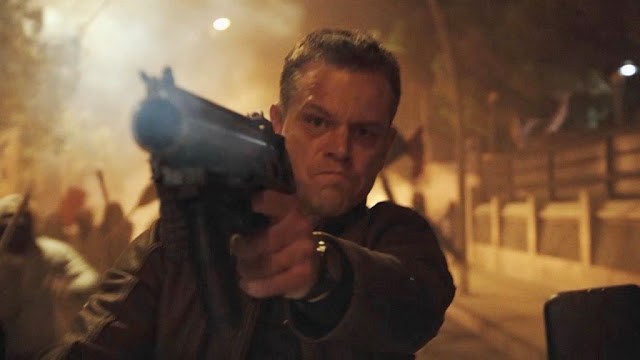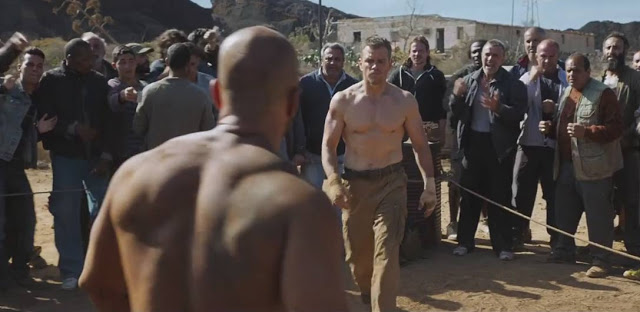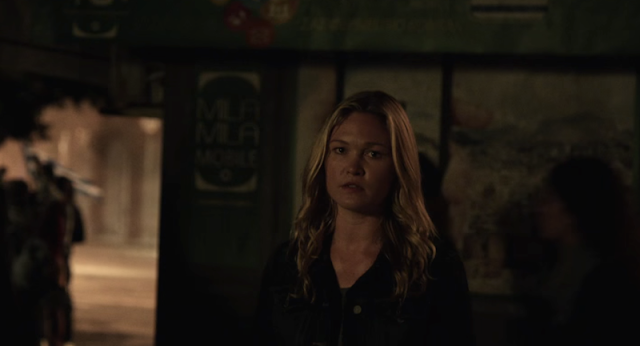Jason Bourne is a superhero. He may not have a costume or a secret identity or alien powers, but he’s nevertheless invincible, terminating his enemies with extreme prejudice and casual efficiency. What made him interesting in the past was his struggle to reconcile his superhuman combat skills with his search for self—there’s a reason that the first novel in Robert Ludlum’s original trilogy was called The Bourne Identity. Doug Liman’s 2002 adaptation of that novel was thrilling not just for its explosive action sequences but for the way it emphasized its protagonist’s confusion and vulnerability, amplified by Matt Damon in a performance of tender brutality. But now, three movies later—four if you count The Bourne Legacy, in which Jeremy Renner stood in for Damon as a Bourne-like surrogate—Jason Bourne knows who he is. The mystery has vanished; all that’s left is the brutality.
When we first meet Jason in this new movie that bears his name, he’s lying low in Greece, numbly participating in underground bare-knuckled boxing matches. (In this, the film oddly resembles the opening of Creed.) Beyond establishing the obvious—that even at age 45, Matt Damon still looks awfully good with his shirt off—this curt opening sequence is designed to demonstrate Jason’s isolation. Yet it tells us nothing we didn’t already know. Jason starts this movie alone, and he ends it alone. There is no character progression, no soul-searching, no catharsis, no real meaning of any kind. Where Jason Bourne was once a superhero, he’s now morphed into a different sort of genre staple: the looming figure who moves implacably toward his quarry, inexorable in his silent bloodlust. He’s the killer in a horror movie.
If nothing else, the film’s first scene is mercifully quick—suffer a single left hook to the jaw from this brooding assassin, and you’re down for the count—a trait not shared by the remainder of Jason Bourne‘s flabby, exhausting set pieces. Returning to the director’s chair is Paul Greengrass, who took over for Liman after the first film to make The Bourne Supremacy and The Bourne Identity before temporarily relinquishing control of the franchise to screenwriter Tony Gilroy. Hailed as an action maestro by many critics, Greengrass certainly has a signature style, which he wields here with all the subtlety of that aforementioned left hook. If you’ve seen either of his prior Bourne pictures, you know what you’re getting: a camera that refuses to hold still; cold-blue lighting in interior scenes; choppy editing across multiple globe-spanning locales; and an absolute premium on speed. He loves putting his players in motion, which can be quite disorienting, given that the average shot in this movie lasts for approximately four nanoseconds. The feverish cutting is intended to spike your adrenalin, but all it really does is bewilder you, making your head hurt as you attempt to track the characters’ movements and spatial relationships. Greengrass’ best film, Captain Phillips, worked because he was physically constrained, shooting in a handful of cramped locations. Here, he has far too much freedom for his own good.
Perhaps “freedom” is the wrong word—there is no room here for innovation. The Bourne franchise is relatively young, but it has quickly developed a mechanical formula that can rival the James Bond films for predictability. Consider: Jason is always being hunted by the CIA, the pursuit invariably led by an officious, amoral bureaucrat who must be portrayed by a distinguished American actor; here it is Tommy Lee Jones, filling the slimy shoes of Chris Cooper, David Strathairn, and (in the pinnacle of the series’ louche villainy) Brian Cox. Said bureaucrat will employ an “asset”, a remorseless killer who rarely speaks and who is played by a handsome foreigner (now Vincent Cassel, picking up the mantle from Clive Owen, Karl Urban, and Edgar Ramírez). Their joint mission is always to kill Jason before he can expose a nefarious black ops program with an ominous-sounding name (forget Treadstone and Blackbriar, now we have Iron Hand!). There will be a perceptive female agent with a tickle of a conscience (Alicia Vikander, replacing Joan Allen), who grows to question her superior’s motives and wonders if Jason isn’t so bad after all. Car chases and fistfights will ensue, with Jason effortlessly outsmarting the CIA goons who scrutinize their surveillance monitors and mutter things like “Where is he?” and “We need to be on that phone!” A new remix of Moby’s electronic hit “Extreme Ways” will play over the credits.
Most importantly—and I say this without irony—there is Julia Stiles. She plays Nicky Parsons, a woman whose relationship with Jason has mutated as the series has progressed; she has been his handler, his hostage, and (most recently) his fellow fugitive and co-conspirator. And she’s been equally watchable as all of them. Stiles has never possessed much screen time in any of the Bourne pictures, but she’s managed to make it count, turning Nicky into a flesh-and-blood character despite minimal dialogue and zero backstory. In Jason Bourne‘s opening scenes, she helps ground the film on a human level, puncturing its increasingly preposterous action with a flicker of mortality.
Alas, that flicker is quickly snuffed out, replaced by a rote plot that is insultingly familiar. At the end of The Bourne Ultimatum, in a scene that should have closed the book on this once-enigmatic character, Jason proclaimed, “I remember everything.” Apparently not. Jason Bourne insists on rewriting history, suggesting that its amnesiac hero still needs to dig into his murky past to discover central truths about himself. And so, once again Jason recalls hazy memories of his pre-Treadstone days, the kind of flashbacks that are required to be filmed through a gauzy filter and freighted with deep import. In essence, the movie is just a remake of Ultimatum—Jason again travels from Europe to America to track down the evil G-men who hijacked his life—only this time, he isn’t seeking answers, but vengeance.
As motivations go, that’s fairly dull, and it does little to rescue the film from an oppressive fog of repetition, a sense that we’re re-watching the same movie as before, only with less excitement. To be clear, Jason Bourne‘s rigorous adherence to the franchise’s established routines doesn’t automatically make it a bad movie; both the James Bond and the Mission: Impossible series illustrate that novelty is not a prerequisite of pleasure. The real problem is the lack of panache that Greengrass brings to the movie’s action sequences. Greengrass will always be too frenetic a filmmaker for my liking, but in his prior Bourne outings, he at least sprinkled in some patience to go with his trademark restlessness. (The first key set piece of Ultimatum remains the series’ pièce de résistance, a brilliant game of high-tech cat-and-mouse.) Here, the primary sensation is one of endless drudgery. Greengrass smashes objects and characters into one another over and over, without any particular wit or flair. He just seems to like making noise. With the exception of a thrilling moment during a late car chase—in which a lithe sports car zooms from an elevated position and crashes onto the roof of a burly SWAT van—the action scenes in Jason Bourne are thoroughly unmemorable.
This humdrum quality is a major disappointment, and it gives voice to the question that underlies everything on screen: why? Why, after a nine-year hiatus, did Greengrass and Damon feel compelled to return to this material? Why is any of this supposed to matter? Sure, there’s a Snowden-lite subplot about a technology entrepreneur (Riz Ahmed, currently killing it on HBO’s The Night Of) who made a deal with the government’s devil, but it feels tossed-off, and while Vikander tries to turn her conflicted operative into a complex figure, the character remains frustratingly opaque. As a result, the movie just functions as an excuse for Greengrass to create chaos and for Damon to exude soulful weariness. Both have done so far better elsewhere, including earlier in this franchise. As relentlessly loud as Jason Bourne may be, when attempting to justify its existence, it goes thunderously mute.
Late in The Bourne Supremacy, after realizing that the world’s most fearsome assassin has the drop on him, Cox’s heavy says, “I don’t suppose it would do me much good to cry for help, huh?” It’s a flash of macabre humor—a concept that is utterly anathema to this installment—but it also proves prescient. It’s fair to wonder if Jason Bourne is a cry for help, a plea for someone new to enter this flagging franchise and inject it with some meaning. As it stands, Jason Bourne is a man in search of a purpose. He and this movie have that in common.
Jeremy Beck is the editor-in-chief of MovieManifesto. He watches more movies and television than he probably should.




